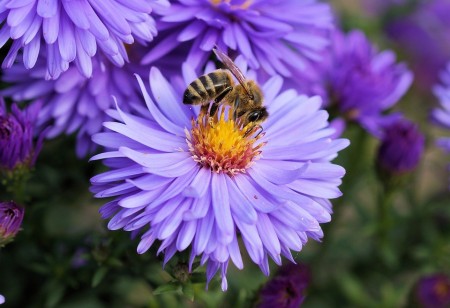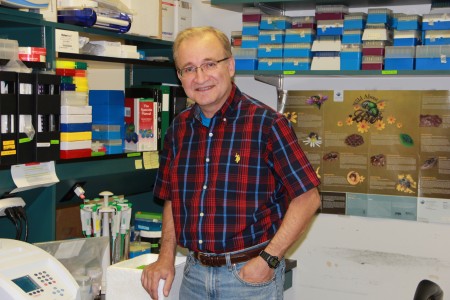 A $1-million gift to the University of Guelph to protect pollinators honours the farming history of an Ontario family and the memory of Donald Pinchin.
A $1-million gift to the University of Guelph to protect pollinators honours the farming history of an Ontario family and the memory of Donald Pinchin.
The donation will create the Pinchin Family Chair in Bee Health and the Don Pinchin Scholarship in Honey Bee Research and Beneficial Insect Health.
Don Pinchin, who died in July 2015, was a “scientist-turned-businessman” who founded Pinchin Ltd., an environmental and building consulting firm.
He was known for his philanthropy and deep appreciation of agriculture, said his wife, Lydia Luckevich.
His parents, Victor and Betty Pinchin, farmed turkeys and later apples, operating one of the first “pick your own” farms in the Greater Toronto Area. Don Pinchin understood well the vital role of pollinators in apple farming and at one point there was a small apiary on the Pinchin farm.
“This chair and scholarship program are a fitting tribute to Don’s memory,” she said.
“It honours his family roots and his love of the environment. Don achieved great success during his lifetime, and he was generous in sharing his success. Our family is pleased that his legacy will endure through this gift.”
Wayne Caldwell, acting dean of the Ontario Agricultural College, said the scholarship and chair will support critical teaching and research to benefit the environment and economy.
Improving the health of bees and other pollinators is of critical importance, Caldwell said, as the diversity and numbers of insect pollinators are falling globally.
“It’s a serious problem that is threatening agriculture and our food system,” he said.
“U of G, with its roots in agriculture and reputation for pollinator research and sustainability, is uniquely positioned to help make a difference.”
The scholarship will be awarded annually to an incoming graduate student interested in studying areas such as ecotoxicology and integrated pest management.
The Pinchin Family Chair in Bee Health will boost research and awareness of the plight of pollinators. It will be held by environmental sciences professor Ernesto Guzman.

“The staff and faculty involved in honey bee research and teaching are very grateful to the Pinchin family for their generous gift,” Guzman said. “I personally feel honoured to have been chosen to hold this position.”
Guzman said the funding will help in recruiting students and post-doctoral researchers. “This will increase our research efforts and advance our knowledge about the causes of bee mortality, as well as find solutions that help the beekeeping industry to keep healthy and productive bee populations.”
Guzman is known for his research on honeybee diseases, especially his 2010 study that determined varroa mites are the main culprit behind mysterious die-offs of honeybee colonies in Ontario. About 35 per cent of the province’s bee colonies were destroyed from 2007 to 2010.
Guzman is developing bees resistant to varroa mites, and is testing natural control products. He works closely with the Ontario Beekeepers’ Association and was a member of the Bee Health Working Group for the Ontario Ministry of Agriculture, Food and Rural Affairs.
Before joining U of G in 2005, he was a research entomologist at the National Institute for Agricultural and Animal Research in Mexico. He was among the researchers who pinpointed the gene responsible for defensive behaviour in Africanized killer bees.